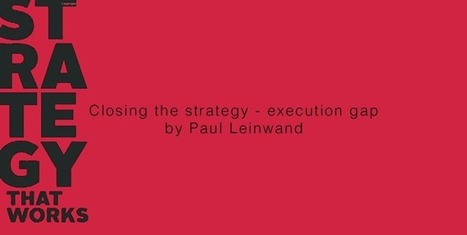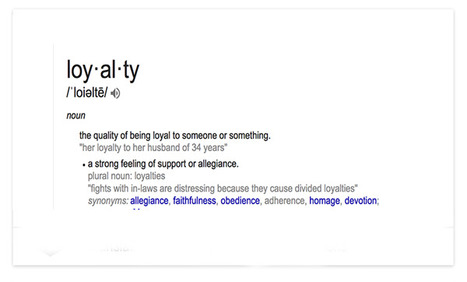Strategy That Works Book Review discusses an important new book by Paul Leinwand sharing an HBR podcast interview with the author, our favorite Moon-Audio.com related example and a link to the book on Amazon. If you need to close the gap between your strategy and execution, and who doesn't, we highly recommend Paul's book.
Get Started for FREE
Sign up with Facebook Sign up with X
I don't have a Facebook or a X account
 Your new post is loading... Your new post is loading...
 Your new post is loading... Your new post is loading...

Eric_Determined / Eric Silverstein's curator insight,
November 7, 2014 2:07 PM
According to a survey, most people would not care if 73% of the brands would disappear!? Share your latest experience on what your favorite brands are doing to earn your Loyalty, and ultimately your Advocacy? It does start with earning your #trust. Great insight @annettefranz @SDLjames with strong value connections @TOMS @USAA
Ahmed Alkandari's curator insight,
November 15, 2014 9:01 PM
"Most people worldwide would not care if more than 73% of brand disappeared." So, are companies wasting their money on advertisements and marketing; since, most people won't care about weather the brand will disappeared or not?! People who have brand loyalty are supposed to care if the brand they are loyal to will be available or not on the future. Also would these people considered faithful to their brand if they don't care? What are brands might been doing wrong with customers? don't focus on the customersare not providing value relative to priceare not providing value relative to the competition/alternativeshave broken customers' trustdon't deliver on their promisesdon't care about customersdon't meet customer expectationsare not innovative (think "same old same old")deliver a fragmented or poor experienceWith all of these point, the relationship between them and their customers will be broken. Therefore, companies should focus more on their customers and design a good customer experience. Companies shouldn't only care about making money, they should also care and focus about being a part of something that matters to people and mean something to them.
Most of the article was asking questions and some questions didn't have answers in the article, they are open for general thinking and answering. It's interesting about how most people won't care if a brand disappeared on the future; for me I would! Of course life won't stop and new brands will enter the market. However, Some brands people got used to it and can's change that easily; the example of Apple. I also found it important about what they mentioned for customers relationship with the company. In my opinion, companies that focuses more on their relationship with their customers and making sure to build an experience with their customers are more successful than companies that focusses on making profits and increase their revenue. I a customer became loyal to a company and he had an experience with that company, he won't mind paying more on that company's goods. The reason is that the company had built a trust and an experience to that customer so he will be faithful and he would care about the brand and the company.

malek's curator insight,
October 1, 2014 7:29 AM
When it's all about falling in love with a purpose not a brand.

Lori Wilk's curator insight,
February 7, 2014 11:09 AM
The business plan creation process can be very time consuming and the benefit of this exercise can be invaluable. I am at FAU in a session right now about how to develop the financial models needed for the business plans. We're talking about the assumptions we are making and justifying where we are getting our numbers and amazing things such as going out into the marketplace and doing the research about what people are willing to pay for. There's an upcoming business plan competition and a room full of people who intend to compete in this huge event at FAU. I recently met several business plan competition winners who have used this money to help them launch their businesses-there can be a huge benefit in creating excellent business plans. Too many businesses go out of business because they don't have the money to stay in business. Many companies that don't make it are gone because they didn't have plans and they weren't prepared for the challenges they actually faced. 
Lou Hemmer's curator insight,
February 16, 2014 12:20 PM
Good article about steps to cover when seeking investment dollars for start ups. A solid management team and understanding where your business fits in the marketplace a essential.

janlgordon's comment,
August 9, 2013 1:47 PM
Marty, this is definitely right on target, great insights as always!!

Agnipravo Sengupta's comment,
August 11, 2013 1:51 AM
Hey Marty, it's so awesome to know that you liked my write-up... Thank you!!
|

John Michel's curator insight,
December 6, 2013 10:06 PM
A great article reminding us all that Smaller is bigger in business, and smaller is not all over the map; it's highly focused. 
Lori Wilk's curator insight,
December 6, 2013 10:40 PM
There is power in focus and it makes it easier for the consumers to identify you company with the one thing you do best. Consumers are so overwhelmed with messages that having a clear message about what your company does helps you to stand out#brand#influence#marketing 
Kimberley Vico's curator insight,
February 11, 2014 7:40 PM
Essentials to find a niche for your success.... follow the 7 steps! |






















